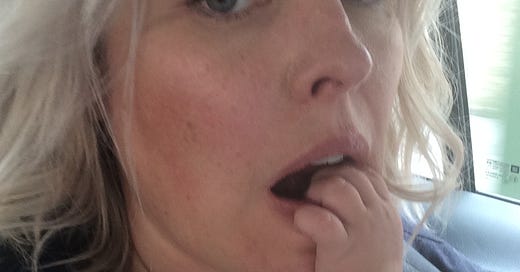Since starting Juvenescence I’ve been the grateful recipient of a steady stream of thoughtful reader emails from asking for advice, mostly about writing, relationships, creativity and how to connect all three to day to day life. While I don’t pretend to be an expert on anything (apart from parallel parking, which I’m freakishly good at for reasons I don’t understand), I try to respond to them all thoughtfully and with care. I’ve enjoyed the process and so I am going to start posting occasional ones here. If you have a quandary or conundrum you’d like me to mull over and respond to, please do send it my way, either by responding through the emailed newsletter or contacting me directly at leahkmclaren@gmail.com .
Dear Leah,
A few years ago I was between teaching jobs and decided to try to write down the story of my childhood. My past is unusual but not very dramatic. I am the only child of an emotionally-distant funeral director and my mother was functionally alcoholic housewife and frustrated painter. We lived in a remote Prairie town where we were part of the community but also somewhat stigmatised and set apart because of the nature of my father’s work. Over the course of four months I managed to produce 60,000 words in a fever but then I went back to work as a supply teacher, got divorced and eventually abandoned it altogether.
For months now I’ve been trying to find the inspiration to go back and pick up where I left off but something keeps stopping me — I feel sick at the thought of even opening up the file. I don’t understand where this feeling of shame and fear is coming from. I am single and independent, my mother is dead and my father is in a home with advanced dementia, so what is holding me back? I’m getting older each day, further away from my past and worried if I don’t write it now I never will.
I need inspiration. Please help?
Yours truly,
Signe

Dear Signe,
Your childhood story is fascinating — both in its particularities (funeral director’s daughter, only child, windswept remote Prairie town) as well as its potential themes (creative frustration, addiction, death, loneliness, existential suffering). So do not despair or question its worth. Rest assured, the material you have is enough.
What is far more important — the thing you must grasp — is that your childhood is fascinating in the same way that all childhood stories are fascinating. Yours is a good story not because of what happened but simply because it did happen. And from the fact of what happened a person was formed. In this case: You.
We are all the products of our own past. And together with certain fixed in-born traits (hair colour, eye colour, intellectual ability, temperament and so on) the peculiar conditions in which we grew up form a whole that is far more than the sum of our respective parts. There is “you” and then there is “your story.” The book you are trying to write exists in the space between the two.
Good storytelling (and memoir in particular) has far less to do with big startling events, shifts or reversals in fortune than with the observation, emotional nuance with which the events that do occur are rendered on the page. The order is important too, but structure you can worry about later, once you have a rough draft. Until then memoir is primarily about about perspective and memory, as rendered through language and voice.
Mary Karr observed that “each great memoir lives or dies based 100 percent on voice. It’s the delivery system for the author’s experience — the big bandwidth cable that carries in lustrous clarity every pixel of someone’s inner and outer experiences.”
The notion that writers “find” their voices is, in my view, a misnomer. Instead, voices are built. In order to craft yours, first you must break all your memories down to their parts. Do not worry too much if they are “true,” because even in its fallibility, memory is truth. (If it wasn’t, humans would have no way to make sense of our lives.) What’s important is not that your memories are honest but that you endeavour to remember honestly, i.e. without vanity or self-regard.
Keep reading with a 7-day free trial
Subscribe to Juvenescence with Leah McLaren to keep reading this post and get 7 days of free access to the full post archives.





